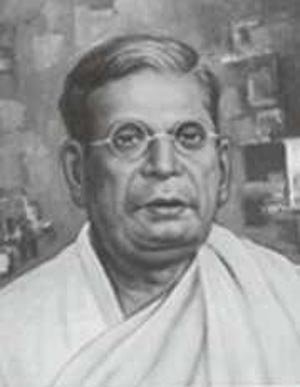
Chittranjan Das was born on November 5, 1870 in Calcutta. Das descended from a family of ‘vaidyas’ or physicians. His father, Bhuben Mohan Das, was a lawyer and journalist. His mother’s name was Nistarini Devi.
After school, Das entered the Presidency college. He excelled at English but did poorly in Mathematics. Das developed a keen interest in Bengali literature and read most works of Bankim Chandra Chatterjee and Rabindranath Tagore. On his father’s advice, Das joined the Bar and the Inner Temple in London. He became a barrister in 1893.
Besides being an astute lawyer, Das was a literary man. Along with Aurobindo Ghosh, he founded the famous journal Bande Mataram. He was also the editor in chief of the journal Forward, a mouthpiece of the Swaraj party.
Das was moved by Gandhiji’s call for non-violent resistance to the British Government. He favoured the boycott of the schools and courts but opposed the boycott of legislative councils.
Das declared that he would give up his practice to set an example for his people. Das played an important role in the boycott of the arrival of Prince of Wales in Calcutta on November 17, 1920. When the Prince stepped into the city he found it deserted. Das did his best to keep the boycott complete and peaceful.
The fallout of the boycott of colleges resulted in many students with no educational institution to go to. Das setup the Bengal National College to fulfill the demands of the students.
In December 1921 Das was arrested. Getting into the police car Das told the crowd, “Men and women of India. This is my message to you. Victory is in sight if you are prepared to win it through suffering.” Conches were blown and flowers showered on Deshbandhu as he was fondly called for the sacrifices he made for the freedom struggle, as the police car started. Deshbandhu was first imprisoned in the Presidency Jail and was moved to the Central Jail where many of his followers were imprisoned. Das was released the following year.
Deshbandhu, along with Motilal Nehru, founded the Swaraj Party in 1923 for maintaining of continued participation in legislative councils. In Bengal many of the candidates fielded by the Swaraj Party were elected to office. The Governor invited Deshbandhu to form a government but he declined. The party came to be a powerful opposition in the Bengal Legislative Council and inflicted defeats on three ministries.
The Calcutta Municipal Act of 1923 was a major landmark in the history of local self-government in India. The Swarajists were elected to the Calcutta Corporation in a majority in 1924. Deshbandhu was elected mayor and Subash Chandra Bose was appointed Chief Executive Officer. Greater efficiency was brought to the administration and many welfare projects were implemented. After giving up his legal practice Deshbandhu went from one of the richest men in Calcutta to one of the poorest. His liabilities amounted to one lakh rupees. The only asset he had was his huge building in Calcutta which he wanted to gift to the nation.
On June 16, 1925, Deshbandhu’s condition worsened. He died while resting in Darjeeling. On Deshbandhu’s death, Subash Chandra Bose said, “The death of Deshbandhu…was for India a national calamity.

